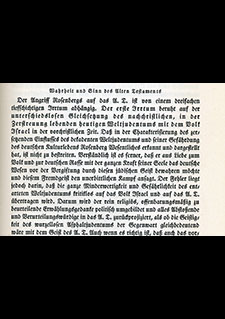Anti-Semitism in the Confessing Church
Over her summer vacation, Elisabeth Schmitz read Walter Künneth’s book “Antwort auf den Mythus” (Response to the Myth), which had been published in the spring and immediately widely circulated. In it, the head of the Center for Apologetics had thoroughly analyzed Alfred Rosenberg’s “The Myth of the Twentieth Century”.
Schmitz was however indignant about Künneths own remarks about Judaism and wrote the theologian, whom she knew fleetingly, a letter in which she criticized:
You speak about our present-day German Judaism no differently than with the presently popular catchphrases of ‘decadent international Jewry’ and ‘asphalt Judaism’, etc., and you actually manage to assert that post-Christian Judaism is ultimately seeking only itself, it abuses the nations and is becoming the ‘carrier’ of ‘international poison’! That means you are generally only familiar with the distorted image of Judaism, at least you only talk about it (Verfolgung, p. 459).
Schmitz was horrified that such remarks were possible in the Confessing Church. Disappointed, she wrote: The church makes it painfully difficult for anyone to defend it (ibid., p. 462). She asked Künneth to revise the incriminating passages if it were reprinted.
Source / title
- © Quote from: Walter Künneth: Antwort auf den Mythus. Die Entscheidung zwischen dem nordischen Mythus und dem biblischen Christus. Berlin 1935, p. 67.

